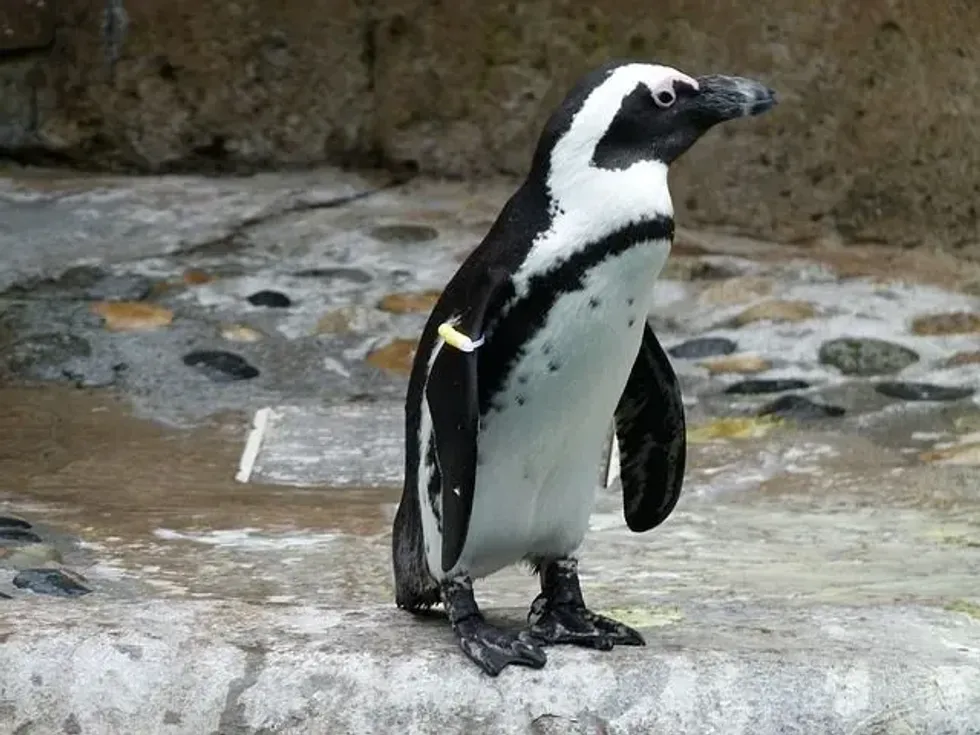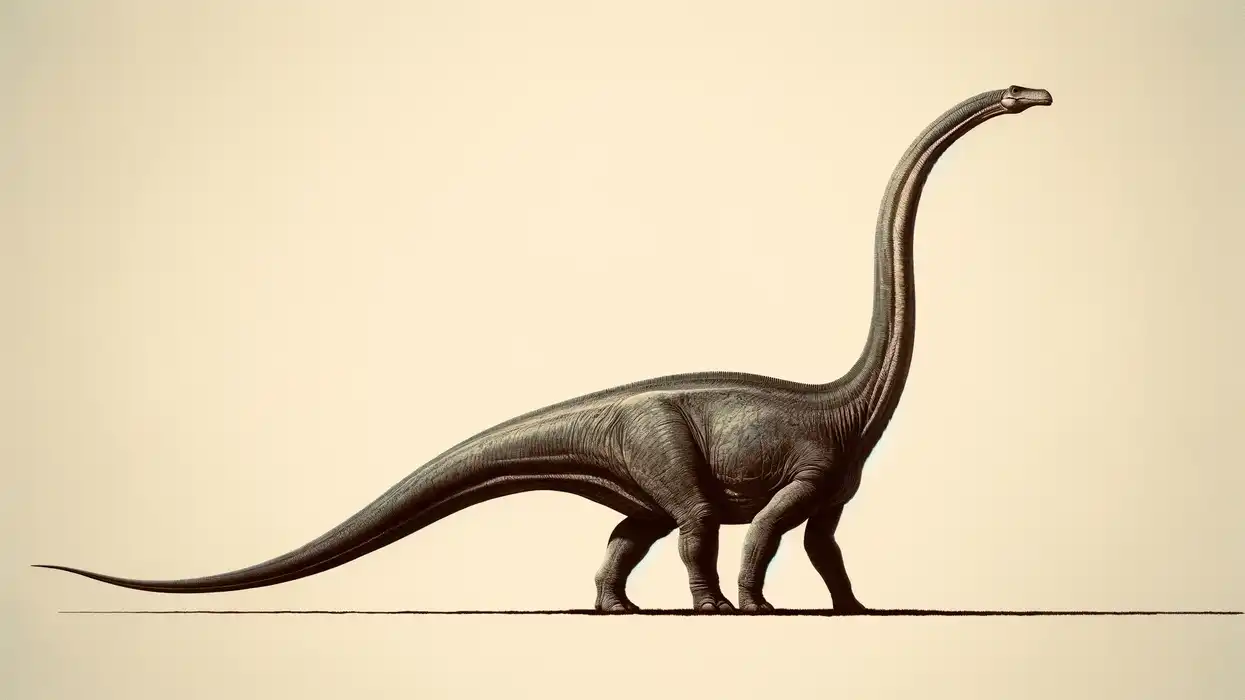African penguins are penguins from South Africa. They are also sometimes called Cape penguins and this black-footed penguin cannot fly. Its feathers and wings are flattened down and it has flippers to survive in its marine habitat.
The adult's weight can range from 4.8-7.7 lb (2.2-3.5 kg) and they are around 23.6-27.5 in (60-70 cm) tall. These African Penguins have pink patches over their eye and a sort of black facial mask. More than just decoration, the pink patches are a gland that helps with their thermoregulation.
African penguins are carnivores that feed on small fish and squids. These African birds from South Africa and Namibia have now become an endangered species for many reasons.
African penguins are extremely rare, and they are famously loved by tourists, among whom some vernacular names of this species include the Cape Town penguin, black-footed penguins, and the jackass penguin due to their extreme resemblance with the donkey-like animal.
One fun fact about this species of the order Sphenisciformes is that it was amongst the original birds described in the 10th edition of the famous 'Systema Natura' by Linnaeus. For more great facts about penguins read on, and don't forget to hop onto our other blogs featuring the king penguin or the colorful scarlet macaw.
African Penguin Interesting Facts
What type of animal is an African penguin?
African penguins are carnivorous birds. They are Aves from the phylum Chordata and the family Spheniscidae.
What class of animal does an African penguin belong to?
African penguins belong to the class Aves.
How many African penguins are there in the world?
The African penguin's population is estimated to be less than 40,000 according to the 2019 census update by the SANCCOB Association of South Africa.
Where does an African penguin live?
African penguins can be found on the Southwestern rocky sea coast of the Indian Ocean.
What is an African penguin's habitat?
African penguins can be found in South Africa, on the coast of Africa from Namibia to Port Elizabeth, and on 25 surrounding islands. The largest colonies are located on Dyer Island. Boulders Beach is a 40-minute drive from Cape Town and this location is home to many large colonies of these endangered penguins and is a major tourist attraction.
Who do African penguins live with?
African penguins prefer living in colonies and African penguins are extremely social birds just like other penguins. They mate, groom and clean each other, and rearrange each other's feathers and a strong peaceful social structure is maintained.
How long does an African penguin live?
On average African penguins live for between 10-27 years in the wild environment. However, it has been observed that they can live up to the age of 30 in a human-controlled environment.
How do they reproduce?
African penguins form bonds with their partners for life and are monogamous by nature. The larger males have a different color pattern to females and both males and females constantly make donkey-like sounds to call each other.
The breeding age of African Penguins is at around two, four, and eight years of age, and the pair that males and females form at this young age tends to last a lifetime unless their breeding fails for any reason.
The breeding season for these animals is between September and February and this is when the breeding pairs meet at breeding areas known as rookeries.
Here, females dig a burrow where they lay one or two penguin eggs which are incubated by both parents for up to 40 days before they hatch chicks.
The African penguin's chicks stay close to their parents until they are one month old and chicks are not only protected from predators during this time frame but are also kept warm and fed.
After reaching the age of three to five months, chicks may have to leave the colonies and their parents if the supply and quality of food in that given area is inadequate.
Chicks come back to the colony after a few years to shed into their adult plumage.
What is their conservation status?
The conservation status of African penguins is Endangered. The African penguin population's decline to this extent has many reasons. For example, two catastrophic oil spills killed around 30,000 of them in 1994 and 2000.
Overfishing in the ocean also reduces their food sources. Excessive tourism and human dominance in their wild environment have also made them scared to hatch eggs and breed. In 2020 only 13,000 breeding pairs of this bird were left.
African Penguin Fun Facts
What do African penguins look like?
African penguins have thick black bands that form the shape of an inverted horseshoe on their bodies. They possess black webbed feet and black spots and stripes which vary between individuals depending upon shape and size.
The characteristic feathers of these birds make them appear even more beautiful.
These dense waterproof feathers are white on the belly region and black on the back, giving penguins a very unique color combination. This color combination helps African penguin colonies as it forms a special type of camouflage, known as countershading, to protect these penguins from predators.
How cute are they?
These flightless birds are very cute and adorable. They are the very reason that places like Boulders Beach and other islands attract a huge amount of tourists.
How do they communicate?
You might be wondering, "what sound does a penguin make?" Well, this jackass animal makes noises very similar to those of a donkey to communicate with others of its kind, earning it the funny monicker.
How big is an African penguin?
A typical African penguin is around 23.6-27.5 in (60-70 cm) tall. On average it is five times smaller than a polar bear.
How fast can an African penguin swim?
The top swimming speed of African penguin populations is somewhere between 12.43 mph (20 kmph).
How much does an African penguin weigh?
African penguins weigh between 4.8-7.7 lb (2.2-3.5 kg).
What are their male and female names of this species?
Male penguins are known as cocks while females are known as hens.
What would you call a baby African penguin?
The young babies which hatch from African Penguin eggs are called chicks.
What do they eat?
African penguins eat small pelagic fishes such as pilchards, sardines, anchovies, horse mackerel, and herring.
Are they predators?
Yes, these birds are carnivores that prey on small fish.
Would they make a good pet?
No, these animals are not domesticable as once domesticated away from their natural habitat (islands and coastal areas) the entire species' breeding will suffer. Domesticated penguins will not be able to produce eggs or chicks to hatch.
Also due to their population being under threat, it is impossible to carry out experimental domestication on these birds at this time, they belong in the wild.
Did you know...
African penguins dig burrows for their eggs. The preferred substrate for these burrows is guano, which is the fecal material of various seabirds and seals. Due to the removal of guano from penguin habitats b humans, these penguins often have to lay their eggs on the surface of the sand, making them more susceptible to predators.
These penguins can nest throughout the year regardless of the typical breeding season.
Contrary to any other penguin species, African penguins do not live in cold climates but on warm sunny coasts.
What is the nickname for African penguins?
The famous nickname of African penguins is jackass penguins because of their distinctive braying.
What does SANCCOB stand for?
SANCCOB stands for the 'Southern African Foundation for the Conservation of Coastal Birds'. This organization plays a vital role in the conservation of these amazing South African penguins, working hard to ensure that their population can endure for years to come along the African coastline and islands.
Here at Kidadl, we have carefully created lots of interesting family-friendly animal facts for everyone to discover! Learn more about some other birds including the chinstrap penguin, or the crowned eagle.
You can even occupy yourself at home by drawing one on our African penguin coloring pages.










